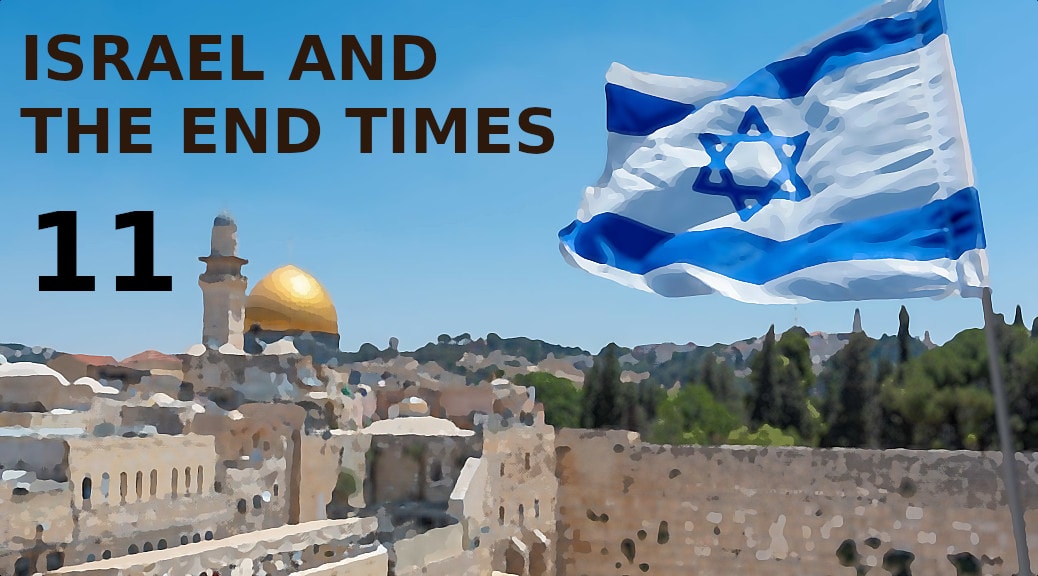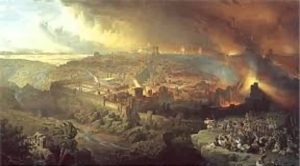Certain prophecies of Ezekiel are sometimes cited as lending support to the idea of the future reconstitution and earthly dominion of the Jewish nation. But on the contrary, they contain many clear warnings of judgments to come upon the house of Israel and the city of Jerusalem; and they also contain predictions — not so clear perhaps as the threatened judgments, because they are capable, like other Old Testament prophecies, of being interpreted according to the desires of the carnal Jewish mind — concerning the recovery that was to be accomplished through the work of the coming Redeemer.
It must ever be borne in mind, while studying Old Testament prophecies which relate to the future of the Jewish people, that we have a sure guide as to their interpretation in the way such prophecies are applied in the New Testament, especially by Paul. And specifically, we have these guiding facts: first, that all the prophecies of mercy to that people that are cited in the New Testament are declared to have their fulfillment in this present era of the Holy Spirit. For all the prophets from Samuel and those that follow after — have likewise (i.e. like Moses, who had been mentioned previously) foretold of these days (Acts 3:24), there being never an instance where the fulfillment is assigned to a future dispensation; and second, that in the New Testament all promises of future blessing for the Jews are applied to the true Israel, it being declared that he is not a Jew who is one outwardly; … but he is a Jew; which corresponds with the heavenly places mentioned in the Epistle to the Ephesians. Ezekiel 21–23 foretell further judgments that were to fall upon Jerusalem, and give details of the general corruption of priests, prophets and people; and Chapter 24 again foretells the approaching woe to the bloody city.
Ezekiel 25–33 are occupied with prophecies of judgments that were to come upon various nations, Tyre, Egypt, Babylon, etc. Ezekiel 28:25 contains the following promise: Thus saith the Lord God: When I shall have gathered the house of Israel from the people among whom they are scattered, and shall be sanctified in them in the sight of the heathen in their land; and they shall dwell safely therein; etc. This promise might have been fulfilled to them in a material sense after their return from the Babylonian captivity; but inasmuch as they did not meet the stipulated condition — for God was not sanctified in them in the sight of the heathen in their land — the promise was forfeited.
Chapter 34 contains one of the clearest of the Old Testament prophecies of the coming of the Savior. The chapter begins with Jehovah’s reproof of the shepherds of Israel, because they had shamefully neglected His sheep — not healing the sick, or bringing again that which was driven away, or binding up that which was broken, or seeking that which was lost. My flock, says He, was scattered upon all the face of the earth and none did search or seek after them (verse 6). What then is the promise of God in view of that state of things? Will God reestablish the nation in the land of Palestine in prosperity exceeding the palmiest days of David and Solomon? So say the teachers of modern dispensationalism; whose leading authority puts it thus: “When Christ appeared to the Jewish people, the next thing in the order of revelation as it then stood should have been the setting up of the Davidic kingdom.”
But what says the Lord God through His servant, Ezekiel? Hearken to this: For thus saith the Lord God; Behold, I, even I, will both search My sheep and seek them out. As a shepherd seeketh out his flock in the day that he is among his sheep that are scattered; so will I seek out My sheep and will deliver them … and I will feed them in a good pasture … I will seek that which was lost, and bring again that which was driven away; and will bind up that which was broken, and strengthen that which was sick (verses 11–16).
Our Lord Himself has declared the fulfillment of this prophecy in one of the best-known chapters in the Bible, John 10. For our present purpose we need only recall these familiar words: I am the good Shepherd; the good Shepherd giveth his life for the sheep … I am the door; by Me, if any man enter in, he shall be saved, and shall go in and out, and find pasture.
Beyond dispute, therefore, Ezekiel 34 is a prophecy of the coming of Jesus Christ to seek His own sheep, to lead them out from the mass of the apostate Jewish nation, to die for them, and in resurrection to be their Prince, their David, who is here, as elsewhere, a type of the blessed and only Potentate, the King of kings and Lord of lords (1 Timothy 6:15). Peter declared the fulfillment of this part of Ezekiel’s prophecy when he confronted the Sanhedrin at Jerusalem with the statement that God had exalted Jesus, whom they had slain, to be a Prince and a savior, for to give repentance to Israel and forgiveness of sins (Acts 5:31).
This chapter (Ezekiel 34) has always been regarded, I believe, until very recent times, as a prophecy of Christ and His spiritual kingdom. Likewise the prophecy of Ezekiel 36:21–38 is a foretelling of the present era; for the blessings of the New Covenant are distinctly foretold. The first step in the fulfillment of this prophecy was the return from Babylon (verse 24); then the preaching of Christ (36: 25; cf John 15:3 and Hebrews 10:22); then the gift of the Holy Spirit (verses 26–27; cf. John 20:22). We have seen that His disciples are the true Israel and their land (the heavenly places) is the true Zion.
In Ezekiel 36 God promises that He will gather His people out of all countries, will bring them into their own land, will sprinkle clean water upon them; will cleanse them from all their filthiness; will put a new heart and a new spirit within them, and will put His Spirit in them (verses 24–27). Manifestly these are promises of gospel blessings, with which God has now blessed His people in heavenly places — the true Zion, their own land. For He gives them a new heart and a new spirit; with the blood of Christ He cleanses them from all sin; and He puts His own Holy Spirit in them. We have seen that the land God gave their fathers, and which they were looking for, was a better country, even a heavenly (Hebrews 11:16; 12:22).
The Valley of the Dry Bones — (Chapter 37)
Here the same prophecy of salvation to the true Israel, the sheep who know their Shepherd’s voice, is given in the form of an allegorical vision. The Spirit of Jehovah transports the prophet from Jerusalem and sets him down in a low lying place, a valley which was full of bones. And says the prophet, He said unto me, Son of man, can these bones live? (verse 3).
This question gives the clue to the significance of the vision. God is bringing to mind that He is the God of Abraham, who quickens the dead (Romans 4:17). That valley represents the dominion of sin and death (Romans 6), and the dry bones represent the state by nature of all the Israel of God; for we were all dead in trespasses and sins ere He quickened us together with Christ (Ephesians 2:1, 5). This was the condition of the whole commonwealth of Israel (Ephesians 2:12).
By this prophecy God makes known that He would employ, in the mighty work of regeneration and recreation, the same agencies He used in the old creation — the Word (Prophecy to these bones) and the Spirit (Breath); for the salvation of all those who compose the Israel of God, that holy nation, is effected by the word of the gospel, preached with the Holy Ghost sent down from heaven (1 Peter 1:12). The chapter foretells the gospel era beginning with the ministry of John the Baptist (who prophesied unto the dry bones of Israel). In verse 4 mention is made of the Word and in verse 9 of the Spirit.
In verse 11 is foreseen the whole house of Israel (the true Israel), a people quickened together with Christ, baptized into His death, and made partakers of His resurrection (See John 5:25; Ephesians 1:1–4; 2:5–6). Historically, in the fulfillment of this wonderful prophecy, when the Fullness of the time was come, God sent forth His Son — not to set up the Davidic kingdom, for which the Jews were looking, but — to redeem them that were under the law — Jews (Galatians 4:4); and He spake unto them the word of life (prophesied unto the bones), the result being that there was a great stir among the Jews, a shaking of the bones; and that a company was formed; the bones coming together, bone to his bone. But there was as yet no live body (verse 7). But at Pentecost there came the mighty Breath of God. God began then to breathe upon those who had been dead in their sins; and they lived, and stood upon their feet. And the work begun that day has been going on ever since, until the company of the regenerated ones has become an exceeding great army, an innumerable multitude (Revelation 7:9).
It is not to be wondered at that the Jewish rabbis should have interpreted this vision as a prophecy of the revival of their nation; for they were grossly carnal in their thoughts (God’s thoughts were not their thoughts, Isaiah 55:8), and they were, moreover, narrowly selfish and exclusive as regards their expectations of Divine blessing. And furthermore, they were ignorant of the mystery of the true Israel (Ephesians 2:12–13; 3:1–6), namely, that the Gentiles should be fellow-heirs, and of the same body, and partakers of His promise in Christ, by (means of) the gospel.
But it is a cause of wonderment that any of those to whom that mystery has been revealed, and who have learned moreover, how the Old Testament prophecies are fulfilled in these days of the Holy Spirit’s presence on earth, should discard what has been the accepted Christian interpretation of these prophecies for nineteen centuries, in favor of that held by those blind leaders of the blind, whose leadership brought about the ruin of the Jewish nation.
P. Mauro







